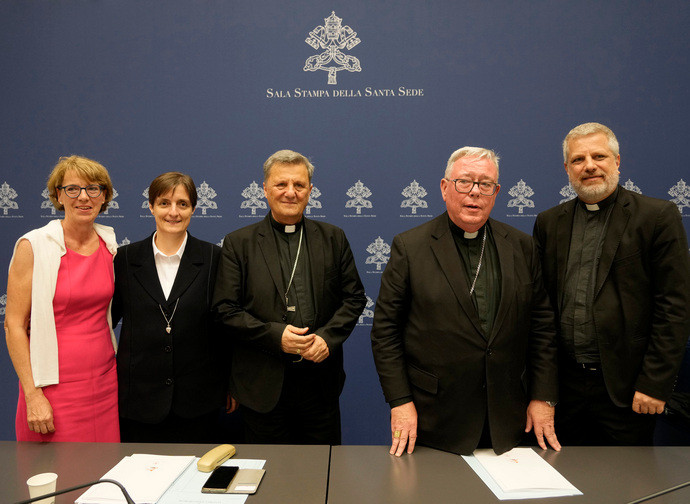Synod planning text makes Church “fluid”
October 4 ,Synod’s Instrumentum Laboris, is presented under the banner of a "journey" without a destination. The only thing certain is that it is a "process" open to any conclusion, even the most revolutionary. Truth is replaced by relations.

The planning document for the Instrumentum Laboris on the synod on synodality to begin on 4 October 2023 and to last a full two years, was announced and presented at a press conference yesterday. It is the working document synod participants will use, the result of the completion of the various preparatory phases that, in turn, had produced other documents.
So what can we understand from reading this working document about which way the wind is blowing for the future synod? In a nutshell, the text appears 'fluid' uncertain about principles, open to being exploited, chargeable of the most diverse outcomes. It provides indications for the synod participants to follow concerning a series of attitudes to be assumed rather than truths to be followed, practices to be implemented but not convictions to be defended and proposed, relations to be held and not truths to be adopted.
Above all, it is not at clear what is meant by 'synodality'. Cardinal Burke recalled that it is known that the Church is 'one, holy, catholic and apostolic', as recited in the Creed, but it is not known what it means that it is synodal. The Church also has within it a dimension of collegiality, but that does not make it collegial; similarly, it also has a dimension of synodality, but that does not make it synodal. Theologically, the idea is uncertain and vague. Even theologically moderate authors, such as the editor of the latest issue of the journal of the Faculty of Theology of the Holy Cross, Miguel de Salis, acknowledge that one is not today "fully equipped to formulate a coherent and complete vision of the subject".
The only thing that is proposed as certain today - including by the document we are discussing - is that synodality is a process, a journey. Establishing what else it is, beyond this, is left to the process itself, the process of the synod on synodality. It will be established as it goes along, as it is in progress, it is an itinerant idea, and therefore always processual and unfinished. Synodality is, in other words, a historical experience, continuous, inexhaustible and, we may also add to better indicate the philosophical origin of this vision, dialectical.
For this reason, the Instrumentum laboris explains the characteristics of the synodal Church through recourse to the experience of those who were involved in the various preparatory stages, diocesan, national, and continental [it was actually an infinitesimal minority of the "people of God" and what is more, made up of specially chosen ecclesial strata, but this is not the point that interests us here, although it is not insignificant]. Experience is a process and during these preparatory meetings, according to the drafters of our document, certain ideas on the characteristics of a synodal Church were gradually matured by all.
Now, experience is the most empty and vague philosophical and theological notion that exists, and it is also very dangerous when one assigns to it the meaning of an event of the Spirit. The fact of meeting and participating in a process is loaded with the revelatory meaning of a divine communication. One is very struck by the many passages of the Instrumentum Laboris in which the 'hearing' (the experience, we may say again) of the participants in the various stages of the preparatory process is abusively, or at least too hastily, called listening to the voice of the Spirit.
Since synodality is believed to be a process resulting from the active participation of the people of God and therefore is an active experience and practice, the synod's working document characterises the 'synodal Church' precisely through attitudes to be assumed, practices to be performed. One of these is listening: the synodal Church is a Church that listens. Another is humility: the synodal Church is a Church that knows it has much to learn. A third is the attitude of encounter and dialogue with everyone (naturally also in reference to the environmental emergency). Then comes the characteristic of a Church that is not afraid of the truth of which it is the bearer, but enhances it without forcing uniformity (a plural Church, one would think ... but how plural?). Obviously, it could not fail to be a welcoming Church as well, open to all. Finally, the most bizarre feature: a Church in touch with the healthy restlessness of incompleteness.
One will not struggle to see the lack of theological consistency of these expressions. This is why I say the instrumentum laboris is a "fluid" text that, as such, remains open to any conclusion, even the most revolutionary. A text from which we can expect anything. An accident? No, because the heart of everything is the process, in which synodality consists. Fluidity favours process, the substitution of truth for relationship, the how taking priority over the what and the why. The Instrumentum is like a trailer for a film whose plot nobody knows and nobody knows how it will end. This is what the director wanted so that he would have the chance to direct it during its course, when synodality will bring forth a new 'ecclesial public opinion' titular of the new munus docendi.
